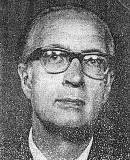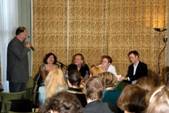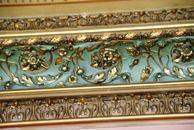Studying Ukraine and Ukrainian
The first attempt to establish Ukrainian studies in the UK was in the early 1920s, when the idea was put forward of establishing a Ukrainian scholarly information centre in London. The centre would work towards establishing a course in Ukrainian studies at a British university. This initiative, however, was not successful.
UCL School of Slavonic and East European Studies

The second attempt, in the mid 1930s, focused specifically on the School of Slavonic and East European Studies (SSEES), then located in Senate House (until 2005, when the current SSEES building was opened).The establishment of a Ukrainian chair at SSEES was proposed by the Anglo-Ukrainian Committee (AUC), formed in 1935, whose members included various British academics (including Robert Seton-Watson of SSEES). The AUC was prepared to raise the necessary funding for this. Initially a library was to be founded and a lectureship set up in Ukrainian history and literature, to be replaced, subsequently, by a professorship. The candidate for the lectureship was Volodymyr Kysilevskyi, who in 1933-36 was a PhD student at SSEES. However, this attempt also came to nothing.

“Only in the very different atmosphere of the Cold War, when enormous efforts were devoted to studying the Soviet bloc in Britain as well as elsewhere in the West, was Victor Swoboda appointed Assistant Lecturer in Russian and Ukrainian at SSEES in 1955” (Syrota, 2004-5). Swoboda (1925-1992), in the photo, right, came to the UK as a refugee in 1948, studied at SSEES, and in 1955 was appointed to his first academic post by William Mathews, who at the time was head of the Department of Language and Literature at SSEES. Swoboda became Lecturer in 1959, and was promoted to Senior Lecturer in 1973 and Reader in 1983. During his time at SSEES, Swoboda taught courses in Ukrainian language, linguistics and literature and published extensively on linguistic, cultural and political topics relating to Ukraine and Eastern Europe. The Rita and Victor Swoboda Fund, set up with a legacy from the Swoboda estate, provides funding for SSEES PhD students researching Ukraine.
Today SSEES offers opportunities to study Ukraine and the Ukrainian language, at undergraduate and postgraduate levels. Among SSEES academics there are currently specialists in Ukrainian politics, history, culture, literature and language. Several PhD students are preparing dissertations on Ukraine-related topics and the multidisciplinary ‘Platform Ukraine’ project was initiated in consequence of the 2013-14 ‘Maidan’ events and the subsequent crisis. The SSEES library has a wide range of books in Ukrainian and on Ukraine. The evening course programme offers Ukrainian language classes to all comers.
London Metropolitan University
An important rôle in Ukrainian Studies from the mid 1990s was played by the University of North London, now the London Metropolitan University, where the Ukraine Centre was set up. The Centre ran courses promoting the study of Ukraine and Ukrainian, and also hosted exchange programmes with academic institutions in Ukraine.
Ukrainian Institute
The Ukrainian Institute, affiliated to the Ukrainian Catholic University in Lviv, promotes the study of Ukraine by organising lectures, round tables and forums on Ukraine-related topics. Ukrainian language classes, from beginners to advanced, take place in the evenings, and there are monthly meetings of a book club to discuss contemporary and classical works of Ukrainian literature. In a recent initiative, in conjunction with the University of Cambridge Ukrainian Studies Programme, the Institute organised a series of presentations by PhD students and early-career academics researching various aspects of Ukraine, including Ukrainian poetic cinema, the dissident movement of the 1960s and 1970s and political corruption. The Institute has also hosted art and documentary exhibitions and book and CD launches. The «Молодий театр» youth theatre has a rehearsal space here.

The writers Andrei Kurkov, Kateryna Khinkulova and Rio Kunder took part in the Ukrainian Writers’ Forum, organised at the Ukrainian Institute in 2008, jointly with SSEES.
The Institute also co-sponsored the Ukrainian Studies Day, an interdisciplinary conference held at SSEES in June 2009.

The Institute was founded in 1979 by the then head of the Ukrainian Greek Catholic Church, Patriarch Josyf Slipyj. It is financially supported by the Ukrainian Religious Society of St Sophia (a UK registered charity). The Institute is located in a listed building in Holland Park. The building also houses a small chapel and a book collection.
Presentations and documentary exhibitions
From 1976 to 1999 the London Ukrainian Graduate Society (a revival of a post-war graduate society), held meetings in London on the first Friday of the month. Each meeting would feature a presentation on a Ukrainian topic, followed by a discussion, wine and cheese. Altogether 160 meetings took place.
The Association of Ukrainians also contributes to the study of Ukraine by organising lectures, book launches and documentary exhibitions (left) at its head office.
 Close
Close

